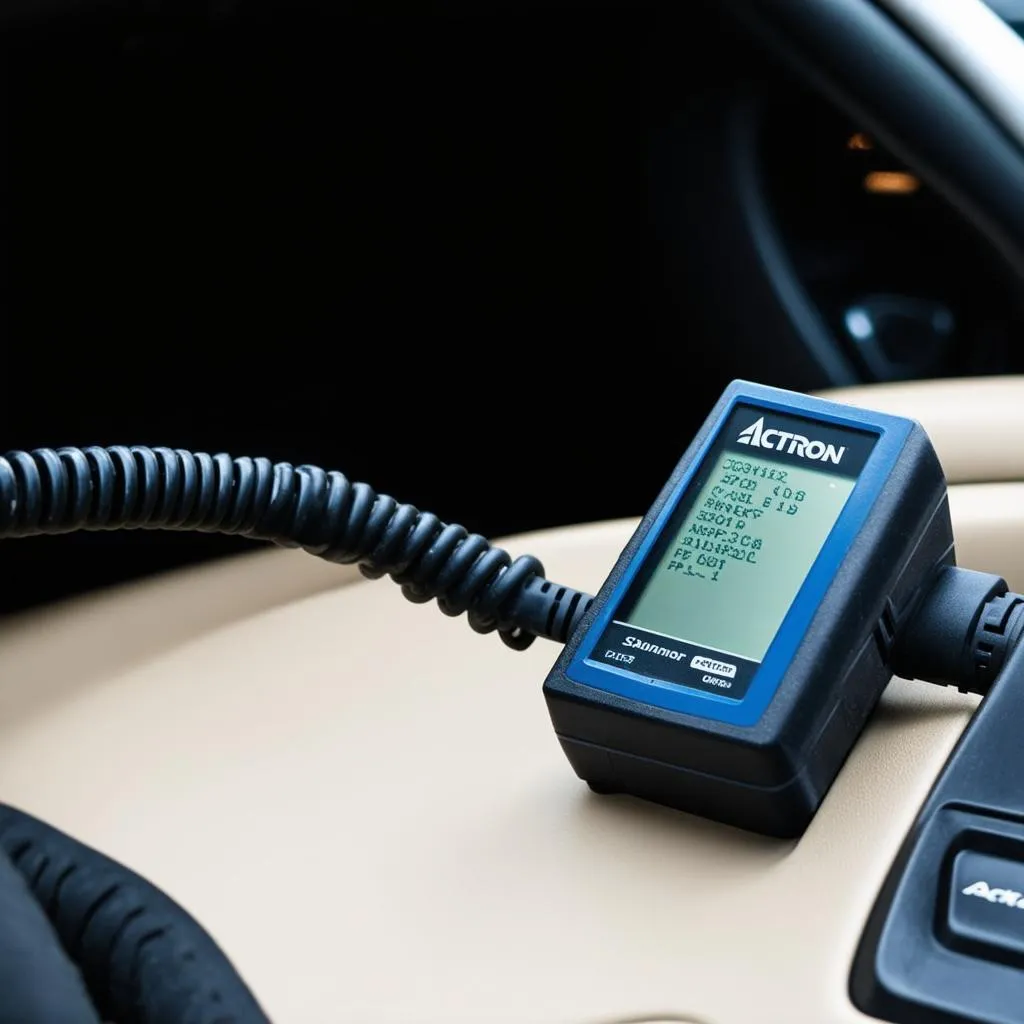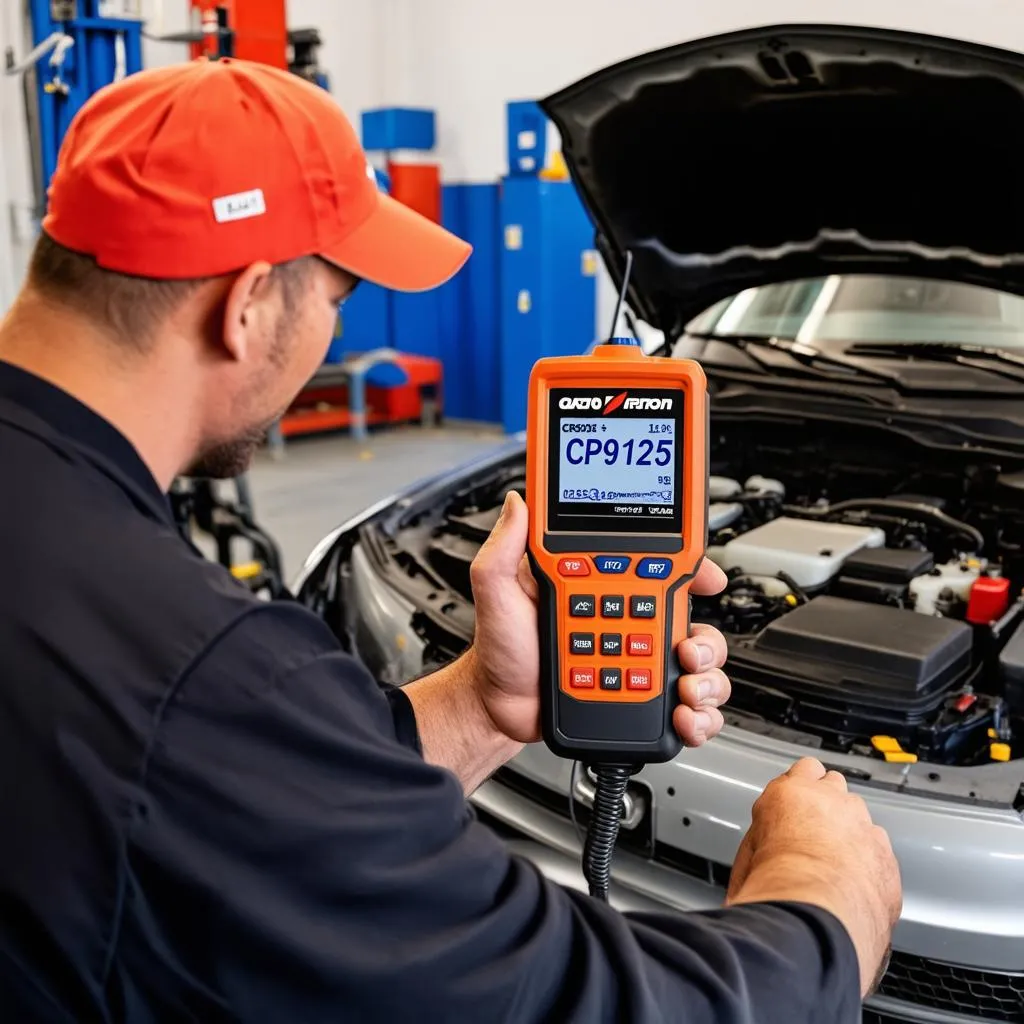Have you ever been driving your trusty European car and suddenly a warning light flashes on your dashboard? That sinking feeling in your stomach is all too familiar for many of us. Before you start picturing worst-case scenarios and hefty repair bills, remember that little device tucked under your dashboard – the OBD II port. More specifically, imagine having a tool like the Actron CP9125 code reader at your fingertips to decipher those cryptic codes illuminating your dash. Let’s demystify the world of Actron Cp9125 Obd Ii Codes and empower you to take control of your car troubles.
Decoding the Actron Cp9125 Obd Ii Codes
The Actron CP9125 is a powerful tool, but the codes it reveals might seem like a foreign language. Let’s break down what these codes mean from different perspectives:
The Mechanic’s Viewpoint: Imagine a mechanic, let’s call him John, at a bustling auto repair shop. He plugs the Actron CP9125 into a sleek BMW, the screen flashes with a “P0420” code. John immediately understands this signifies a potential catalytic converter issue. He explains to the worried owner, “This code suggests your catalytic converter might not be working efficiently. We’ll need to investigate further.”
The Car Owner’s Dilemma: From a car owner’s perspective, seeing a code like “P0171” can be unnerving. It might mean a lean fuel mixture, but what does that even mean? Is it a simple fix or a sign of a bigger problem? This is where understanding OBD II codes becomes crucial.
The Technical Perspective: Technically, OBD II codes are standardized. The Actron CP9125 acts as a translator, taking the car’s computer signals and converting them into these alphanumeric codes, giving you a starting point for diagnosis.
The Financial Angle: Early detection of car problems using the Actron CP9125 can save you money in the long run. Ignoring a simple “P0301” code (misfire in cylinder 1) might seem harmless initially, but it could lead to costly engine damage if left unresolved.
Navigating the Labyrinth: Common Actron CP9125 Codes and Solutions
Let’s explore some frequently encountered codes and how to approach them:
P0420 – Catalyst System Efficiency Below Threshold (Bank 1): As John, our expert mechanic, mentioned, this code often indicates a catalytic converter problem.
- Possible Causes: Faulty oxygen sensors, engine misfires, or a failing catalytic converter.
- Troubleshooting: Check for exhaust leaks, inspect oxygen sensor readings, or consult a mechanic for a professional diagnosis.
P0171 – System Too Lean (Bank 1): This code suggests your engine is running with a lean fuel mixture, meaning there’s too much air compared to fuel.
- Possible Causes: Vacuum leaks, faulty fuel injectors, or a malfunctioning mass airflow sensor.
- Troubleshooting: Inspect vacuum hoses, check fuel pressure, or have a mechanic diagnose the issue.
P0301 – Cylinder 1 Misfire Detected: This code signals an engine misfire, specifically in cylinder 1.
- Possible Causes: Faulty spark plugs, ignition coils, fuel injectors, or compression issues.
- Troubleshooting: Replace spark plugs, inspect ignition coils, or consult a mechanic for further diagnosis.
Beyond the Codes: Tips and Tricks
- Consult Reliable Resources: Refer to your car’s repair manual or reputable online resources for detailed information on specific OBD II codes.
- Don’t Panic, Seek Professional Help: While the Actron CP9125 can guide you, don’t hesitate to seek help from a qualified mechanic, especially for complex issues.
- Regular Maintenance is Key: Preventative maintenance, such as regular oil changes and tune-ups, can prevent many OBD II codes from appearing in the first place.
Unlocking More Than Just Codes
Beyond the technicalities, the Actron CP9125 represents empowerment. It’s like having a direct line of communication with your car, allowing you to understand its needs and address issues proactively. It’s about taking control and being an informed car owner.
Frequently Asked Questions
Here are some common queries about Actron CP9125 OBD II codes:
- Q: Can I clear the codes myself?
- A: Yes, the Actron CP9125 allows you to clear codes. However, it’s essential to address the underlying issue before clearing them.
- Q: Are OBD II codes universal?
- A: Yes, OBD II codes are standardized across most car models sold in the US after 1996.
- Q: Can I use the Actron CP9125 on any car?
- A: While the Actron CP9125 is primarily designed for European cars, it can work on other makes and models with OBD II ports. However, compatibility may vary.
Related Questions
You might also be interested in:
- What are the most common OBD II codes for Volkswagen cars?
- How often should I get my car’s engine checked?
- What are the benefits of using a professional-grade OBD II scanner?
Products to Explore
- Actron CP9690 Elite AutoScanner
- Innova 3160g Bluetooth Code Reader
Compatible Car Brands
- Audi
- BMW
- Mercedes-Benz
- Volkswagen
- Porsche
- Volvo
Need Further Assistance?
Feeling overwhelmed or need help interpreting those codes? Don’t hesitate to reach out to our team of automotive experts via WhatsApp at +84767531508. We’re available 24/7 to provide guidance and support.
Remember, knowledge is power when it comes to car maintenance. By understanding Actron CP9125 OBD II codes, you’re taking a proactive step towards a smoother, more confident driving experience.
 car diagnostic tool
car diagnostic tool
 car repair shop
car repair shop